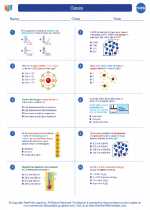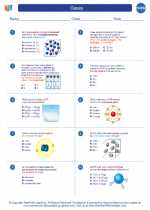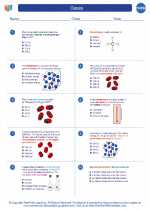Gases -> experiments
Experiments
An experiment is a procedure carried out to support, refute, or validate a hypothesis. It is a crucial aspect of the scientific method, and it allows scientists to test their theories and understand the natural world. In the field of chemistry, experiments are conducted to observe chemical reactions, test the properties of substances, and gather data for analysis. Understanding how to design and conduct experiments is essential for any student studying chemistry.
Key Concepts
When conducting experiments in chemistry, there are several key concepts to keep in mind:
- Hypothesis: Before conducting an experiment, it's important to formulate a clear hypothesis, which is a tentative explanation for an observation or a scientific problem. The hypothesis should be testable and based on existing knowledge.
- Variables: In an experiment, there are typically independent and dependent variables. The independent variable is the factor that is deliberately changed by the experimenter, while the dependent variable is the factor that may change in response to the independent variable.
- Controlled Variables: These are the factors that are kept constant during the experiment to ensure that the only thing affecting the dependent variable is the independent variable.
- Experimental Design: This refers to the overall plan for conducting an experiment, including the selection of materials, the sequence of steps, and the methods for collecting and analyzing data.
- Accuracy and Precision: It's important for experiments to be both accurate (closeness of a measurement to the true value) and precise (reproducibility of measurements).
- Safety: Safety precautions are crucial when conducting experiments in chemistry. This includes proper handling of chemicals, the use of protective equipment, and adherence to laboratory safety guidelines.
Study Guide
Here are some steps to follow when preparing for and conducting experiments in chemistry:
- Define the Problem: Clearly articulate the scientific problem or question that you want to investigate through the experiment.
- Research and Formulate a Hypothesis: Review existing literature and scientific knowledge related to the problem, and use this information to develop a testable hypothesis.
- Identify Variables: Determine the independent and dependent variables in the experiment, as well as any controlled variables that need to be kept constant.
- Design the Experiment: Plan the experimental procedure, including the materials needed, the steps to be followed, and the methods for data collection.
- Conduct the Experiment: Follow the experimental plan carefully, making precise measurements and observations while adhering to safety protocols.
- Analyze Data: Organize and analyze the data collected during the experiment, using appropriate statistical methods if necessary.
- Draw Conclusions: Based on the data analysis, determine whether the hypothesis is supported or refuted, and draw conclusions about the scientific problem being investigated.
- Communicate Results: Present the findings of the experiment through a scientific report or presentation, and discuss the implications of the results.
By following these steps and understanding the key concepts of experimentation in chemistry, students can develop their skills in designing, conducting, and analyzing experiments, which are essential for success in the field of chemistry.



